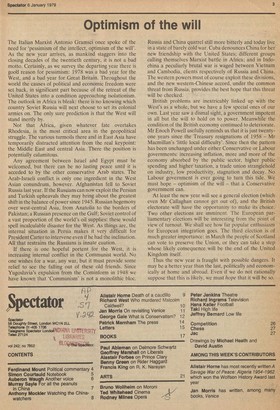Optimism of the will
The Italian Marxist Antonio Gramsci once spoke of the need for 'pessimism of the intellect, optimism of the will'. As the new year arrives, as mankind staggers into the closing decades of the twentieth century, it is not a bad motto. Certainly, as we survey the departing year there is goold reason for pessimism: 1978 was a bad year for the West, and a bad year for Great Britain. Throughout the world the causes of political and economic freedom were set back, in significant part because of the retreat of the United States into a condition approaching isolationism. The outlook in Africa is bleak: there is no knowing which country Soviet Russia will next choose to set its colonial armies on The only sure prediction is that the West will stand inertly by.
Not that Africa, given whatever fate overtakes Rhodesia, is the most critical area in the geopolitical struggle. The various turmoils there and in East Asia have temporarily distracted attention from the real keypoint: the Middle East and central Asia. There the position is potentially calamitous.
Any agreement between Israel and Egypt must be welcomed, but there can be no lasting peace until it is acceded to by the other conservative Arab states. The Arab-Israeli conflict is only one ingredient in the West Asian conundrum, however. Afghanistan fell to Soviet Russia last year. If the Russians can now exploit the Persian and Turkish upheavals they may bring about the greatest shift in the balance of power since 1945. Russian hegemony over west-central Asia, from Anatolia to the borders of Pakistan; a Russian presence on the Gulf; Soviet control of a vast proportion of the world's oil supplies: these would spell incalculable disaster for the West. As things are, the internal situation in Persia makes it very difficult for President Carter to intervene even if he had the inclination. All that restrains the Russians is innate caution.
If there is one hopeful portent for the West, it is increasing internal conflict in the Communist world. No one wishes for a war, any war, but it must provide some relief to see the falling out of these old friends. Since Yugoslavia's expulsion from the Cominform in 1948 we have known that 'Communism' is not a monolithic bloc. Russia and China quarrel still more bitterly and today live in a state of barely cold war. Cuba denounces China for her new friendship with the United States; different groups calling themselves Marxist battle in Africa; and in Indochina a peculiarly brutal war is waged between Vietnam and Cambodia, clients respectively of Russia and China. The western powers must of course exploit these divisions, and the new western-Chinese accord, under the common threat from Russia, provides the best hope that this threat will be checked.
British problems are inextricably linked up with the West's as a whole, but we have a few special ones of our own. Last year saw a dismal sight, a government impotent in all but the will to hold on to power. Meanwhile the condition of the British economy continued to deteriorate. Mr Enoch Powell usefully reminds us that it is just twentyone years since the Treasury resignations of 1958 — Mr Macmillan's 'little local difficulty'. Since then the pattern has been unchanged under either Conservative or Labour governments: increasing inflation, more and more of the economy absorbed by the public sector, higher public spending and higher taxation, a trade union stranglehold on industry, low productivity, stagnation and decay. No Labour government is ever going to turn this tide. We must hope — optimism of the will — that a Conservative government can.
At least the new year will see a general election (which even Mr Callaghan cannot get out of), and the British electorate will have the opportunity to make its choice. Two other elections are imminent. The European parliamentary elections will be interesting from the point of view of turnout. We shall see how far popular enthusiasm for European integration goes. The third election is of much greater importance: in March the people of Scotland can vote to preserve the Union, or they can take a step whose likely consequence will be the end of the United Kingdom itself.
Thus the new year is fraught with possible dangers. It may be a better year than the last, politically and economically at home and abroad. Even if we do not rationally suppose that this is likely, we must hope that it will be so.






























 Previous page
Previous page